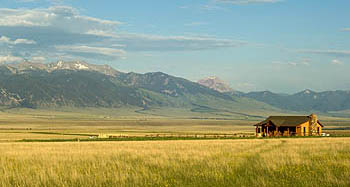PERC Office
Bozeman, MT
June 9–11, 2010
Directed by Reed Watson
Agenda
Papers
Overview:
Land use conflicts have become commonplace in the West. The federal lands system is highly litigious and shows little promise for balancing the traditional and non-traditional demands on public lands. Private lands garner significant controversy too. Disputes over open space provision, public access and wildlife habitat on private lands feature prominently in the popular press and in the courts. This acrimony raises important questions about the effectiveness of the institutions that govern Western land management.
Whether focused on public or private lands, the goal for each discussion paper is to refine the way we think about and use markets as tools for making land management decisions. Specific to public lands, the forum will focus on ways federal agencies can adopt market-based principles to avoid the tragedy of the commons and the land use conflicts that plague the federal estate. Existing programs and new ideas will be discussed.
For private lands, the question is one of innovation: whether clearly defined property rights reduce transaction costs and stimulate new markets for environmental amenities like open space and ecosystem services. In theory, contracting of this sort has the potential to reduce the acrimony and conflict surrounding private land management, but questions of design and implementation must first be answered.
Sessions and Discussion Topics:
I. Contracting for Ecosystem Services (James Salzman, Curtis Freese) In recent years, a new appreciation has emerged for ecosystem services. This session will explore the potential of payment of ecosystem service (PES) programs to account for the environment’s natural capital, what we often refer to as "the wealth of nature." From a conceptual and a practical perspective, this session will explore the necessary conditions of government-run PES programs and those of private contracting for ecosystem services.
II. Public Goods from Private Lands (David Haddock, Todd Graham) Private lands often generate public goods like open space, wildlife viewing, carbon sequestration or water purification. Traditional thinking suggests such goods are underproduced because private landowners have little or no incentive to produce them. Is this thinking correct? If so, what policies or entrepreneurial innovations might align in the incentives of private landowners with the production of such goods and services? Is a more clearly defined rights structure needed? This session will address these and related questions.
III. Public Wildlife, Private Lands, and the Public Trust Doctrine (Reed Watson, James Knight) State owned wildlife often inhabit private land and their presence may impose benefits, costs or both on the private landowner. The rights and responsibilities of private landowners relative to the state, and vice-versa, remain unclear. Does the state owe the landowner compensation for wildlife forage consumption? Does the landowner have any obligation to allow hunting access or may the landowner harbor the wildlife from hunting pressure? The questions have gone unanswered for years, and the application of the public trust doctrine to wildlife further complicates the answer. This session will focus on the possibilities and challenges inherent in public-private contracting for wildlife habitat and hunting access.
IV. Communal Property and Community-Based Stewardship (Brian Steed, Dave Cameron) In his seminal work The Tragedy of the Commons, Hardin says "freedom in a commons brings ruin to all." Some have interpreted this statement to suggest communal ownership and resource stewardship are mutually exclusive. This session will focus on the contrary premise, that communal ownership of environmental resources may encourage environmental stewardship or, in some situations, be a necessary ingredient of large-scale conservation efforts. It will also discuss the challenges to communal environmental stewardship such as increased transactions costs.
V. Private Rights in Public Resources (Robert Nelson) Public resources are, by definition, owned by the public, yet a significant number of publicly owned resources are consumed by private actors. This situation raises a number of interesting questions relating to property theory, equity, cultural norms and economic efficiency – not least of which is how to balance traditional, extractive uses with newer, amenity-based demands. This session will focus on use conflicts in public resources and the potential for market and rights-based solutions.
VI. Split Ownership, Rent Seeking and Post Contractual Opportunism (Terry Anderson, Clive Strong)
TBD
VII. Getting out of the Multiple Use Box (Holly Fretwell) Public ownership of public lands suggests they be managed for multiple uses, but incompatible demands often lead to conflicted management objectives and general dissatisfaction. Timber harvesting may disrupt recreational opportunities; snowmobiles may disrupt migration patterns; wolves may disrupt elk hunting, and so on. Could market mechanisms provide a less contentious means of partitioning the federal estate between seemingly incompatible uses? This conceptual question and the more practical ones that follow are the focus of the last session.
Invited Discussant: Tim Fitzgerald




